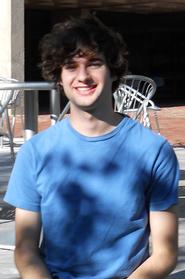
Entrepreneurship among immigrants to the U.S. has a significant impact on the economy’s growth. In fact, much of population growth in the U.S. comes from immigration. Yet many economists do not study this particular facet of economic development in detail. Noah Ford ’13, a recipient of a 2011 Levitt Research Fellowship Grant, is exploring immigrant entrepreneurship with Professor of Economics Paul Hagstrom for the project “The Effects of Local Networks on First and Second Generation Immigrant Entrepreneurs in the United States.” Their efforts aim to examine the effects of immigrant networks on entrepreneurship.
According to Ford, “In the current economy, economists believe that small businesses have the most potential for providing growth.” In light of this belief, it seems imperative to study what kind of environment encourages entrepreneurship and how different networks affect start-up rates. Using census data, Ford and Hagstrom intend to employ statistical programming to study trends in self employment among immigrants.
However, it remains unclear how a network of immigrants should be defined. Most economists have defined networks based solely on the concentrations of immigrants living in a particular area. Currently, research on entrepreneurship in immigrants has indicated that there is little relationship between self employment and immigrant networking.
However, when taking into account more than just the concentration of immigrants in one area, a more nuanced and complex picture emerges. Ford and Hagstrom are delving deeper into the particular network factors that influence self employment the most, including network income per capita, house ownership rates, and average house value within the network. Ultimately, Hagstrom and Ford hope to develop a better definition of a network to reflect their findings in the most accurate possible way.
By studying immigrant networks in such detail, Ford has come across some interesting observations that otherwise would remain hidden in his data. Though they have not finished testing, it seems that on its own, higher concentrations of immigrants from the same country will decrease rates of entrepreneurship, possibly because people within the network will help others into the labor market, discouraging self-employment.
However, network income per capita has a strong effect on entrepreneurship, which may have to do with wealthier immigrants being more likely to supply capital to those who want to start a new business. For example, it appears that Korean immigrants interested in starting businesses are more likely to get capital from other Koreans than from other sources.
To run tests and analyze their results, Ford is writing statistical programs that manipulate raw data to bring out the aspects he is most interested in. He and Hagstrom are currently relying on 2000 Census data to run their tests, but they hope that when the 2010 Census data is made available they will be able to easily transfer that information to the programs they have already designed.
Ford, a double major in math and economics, looks forward to gaining specific, real-world experience in microeconomics, as most of his economics coursework thus far has revolved around broad-based theory. He also looks forward to learning what economists do on a day-to-day basis from a firsthand perspective. Ford has conducted a lot of background research on the subject, but he is particularly enjoying running tests based on programs that he designed himself. He notes that after so much reading and programming, it’s rewarding to actually input data and analyze real results.
Noah Ford is a graduate of Rowland Hall-St. Mark’s School in Salt Lake City, Utah.
